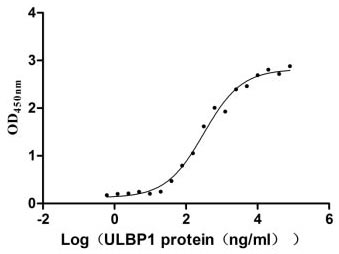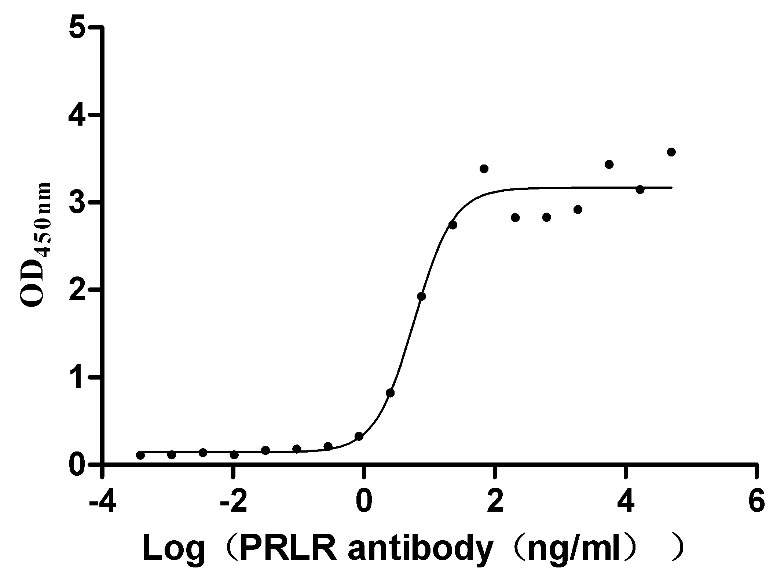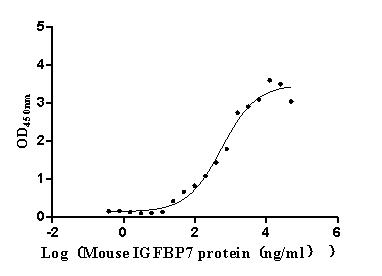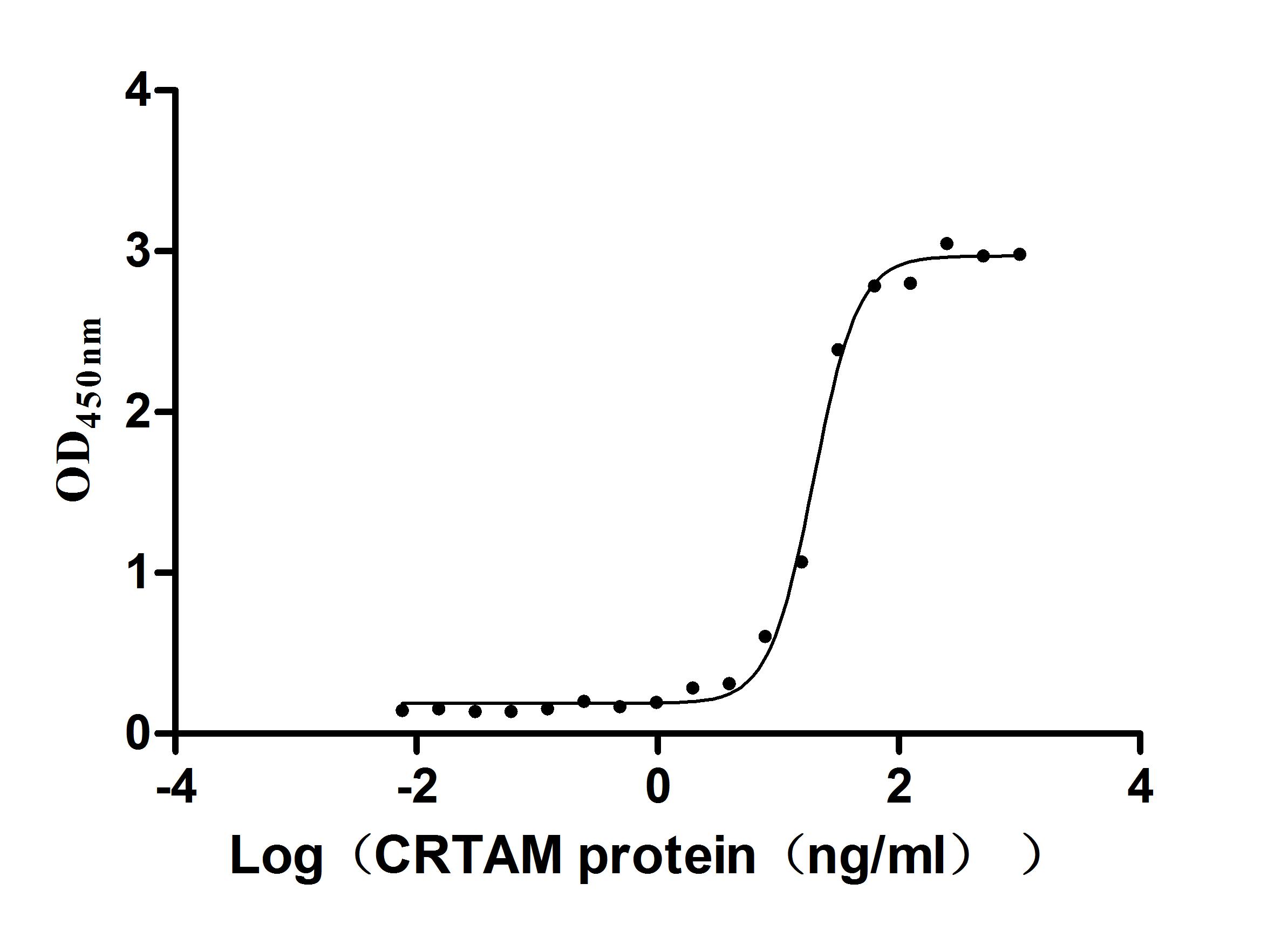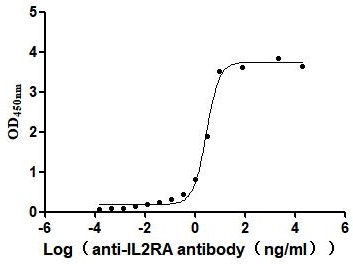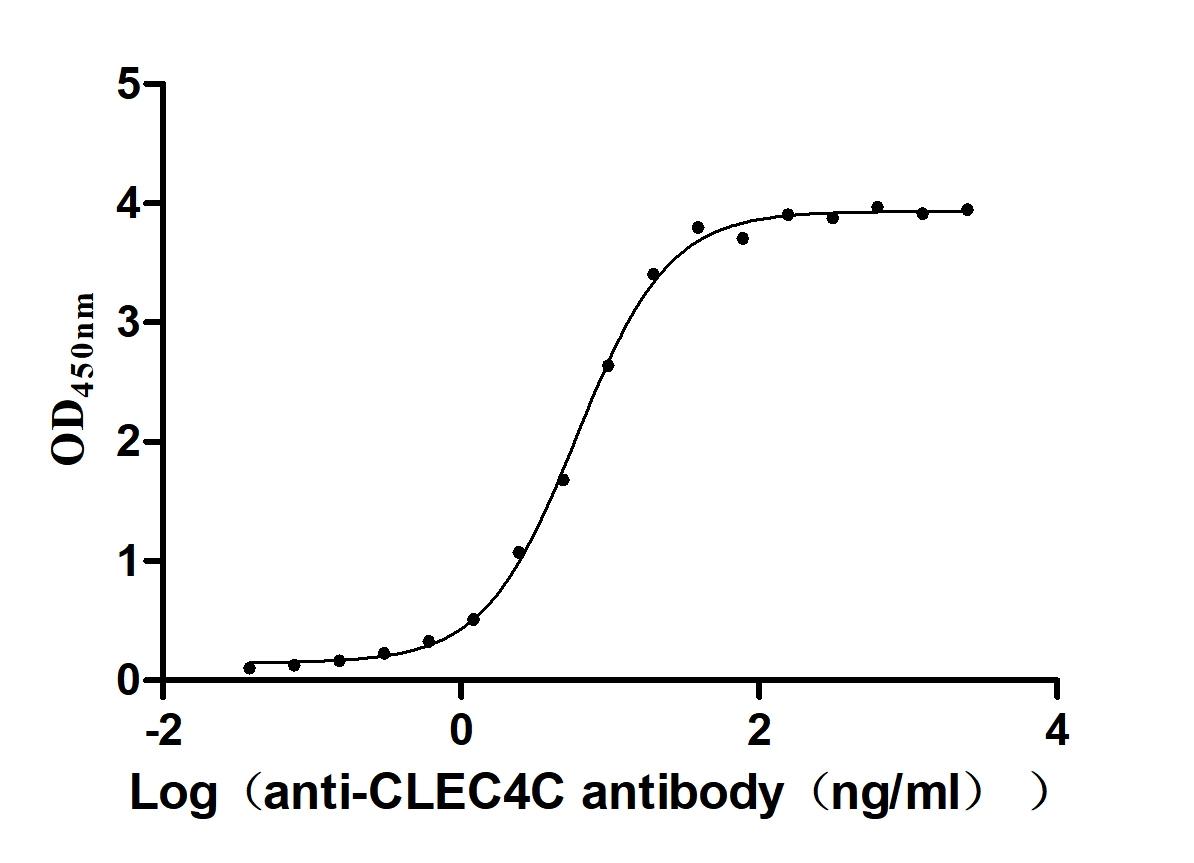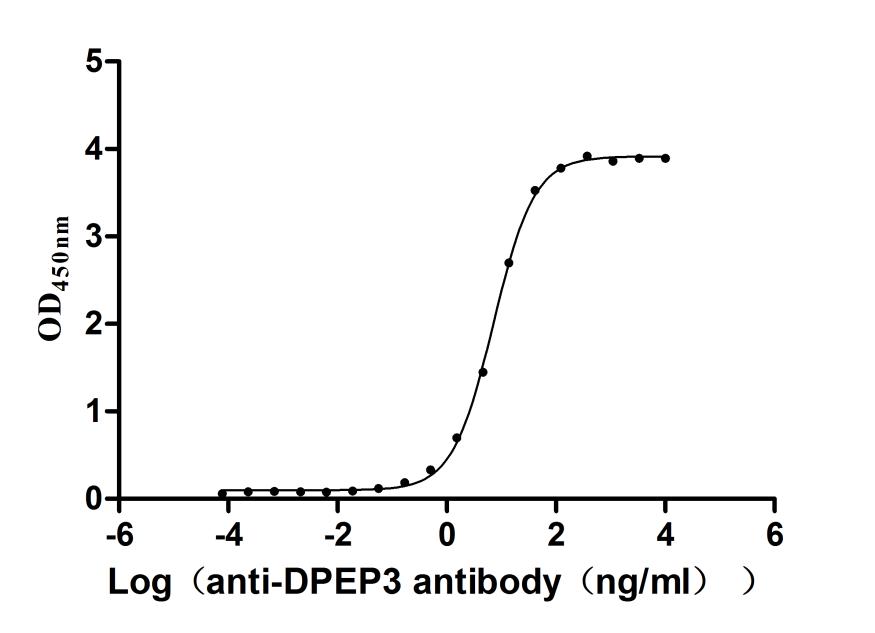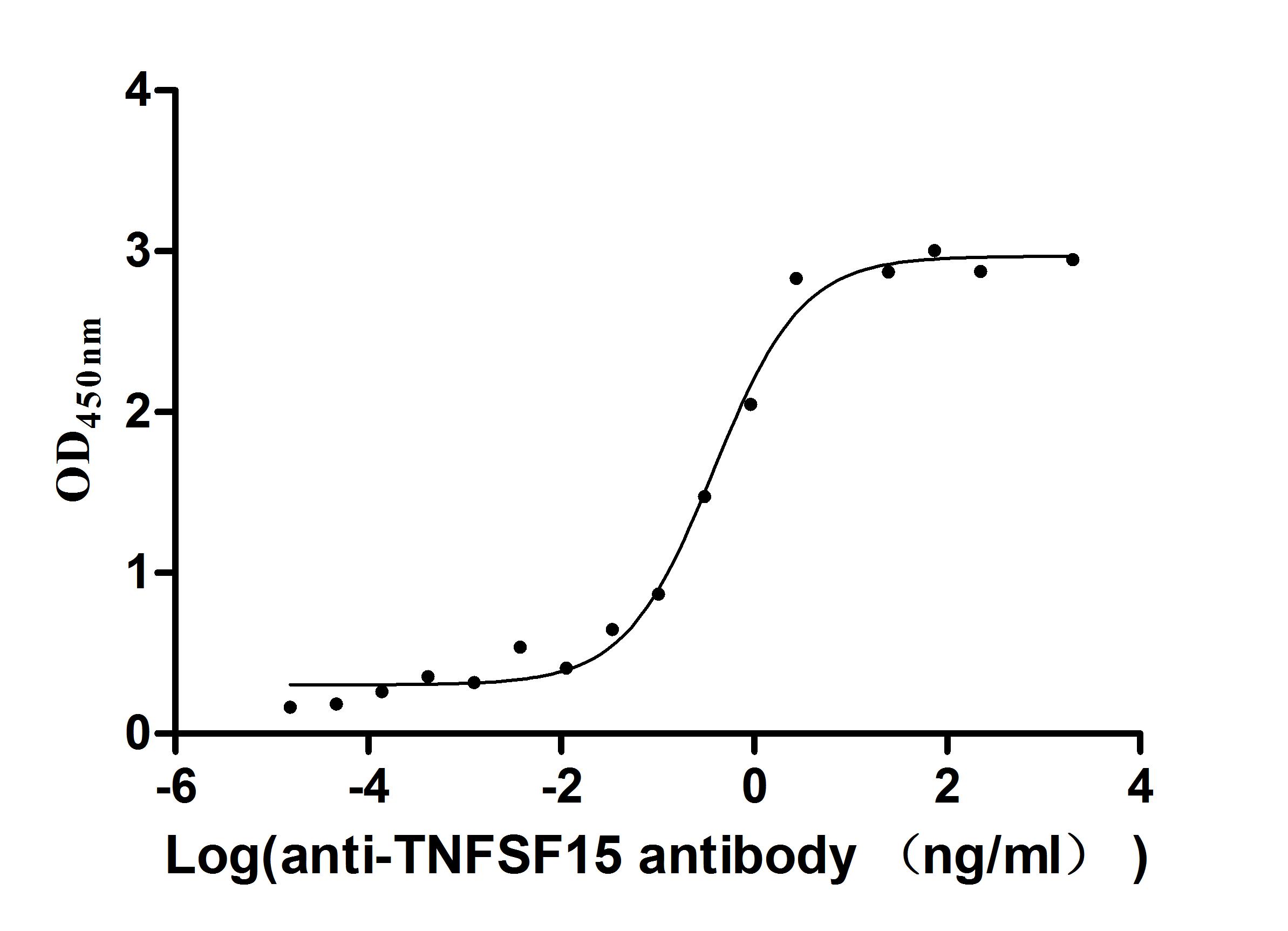Recombinant Rat Corticosteroid 11-beta-dehydrogenase isozyme 2 (Hsd11b2)
-
货号:CSB-YP010765RA
-
规格:
-
来源:Yeast
-
其他:
-
货号:CSB-EP010765RA
-
规格:
-
来源:E.coli
-
其他:
-
货号:CSB-EP010765RA-B
-
规格:
-
来源:E.coli
-
共轭:Avi-tag Biotinylated
E. coli biotin ligase (BirA) is highly specific in covalently attaching biotin to the 15 amino acid AviTag peptide. This recombinant protein was biotinylated in vivo by AviTag-BirA technology, which method is BriA catalyzes amide linkage between the biotin and the specific lysine of the AviTag.
-
其他:
-
货号:CSB-BP010765RA
-
规格:
-
来源:Baculovirus
-
其他:
-
货号:CSB-MP010765RA
-
规格:
-
来源:Mammalian cell
-
其他:
产品详情
-
纯度:>85% (SDS-PAGE)
-
基因名:Hsd11b2
-
Uniprot No.:
-
别名:Hsd11b2; Hsd11kCorticosteroid 11-beta-dehydrogenase isozyme 2; EC 1.1.1.-; 11-beta-hydroxysteroid dehydrogenase type 2; 11-DH2; 11-beta-HSD2; NAD-dependent 11-beta-hydroxysteroid dehydrogenase
-
种属:Rattus norvegicus (Rat)
-
蛋白长度:full length protein
-
表达区域:1-400
-
氨基酸序列MERWPWPSGG AWLLVAARAL LQLLRSDLRL GRPLLAALAL LAALDWLCQR LLPPPAALVV LAGAGWIALS RLARPPRLPV ATRAVLITGC DTGFGKETAK KLDAMGFTVL ATVLDLNGPG ALELRARCSP RLKLLQMDLT KPEDISRVLE ITKAHTASTG LWGLVNNAGL NMVVADVELS PVVTFRECME VNFFGALELT KGLLPLLRHS RGRIVTVGSP AGDMPYPCLA AYGTSKAAIA LLMDTFSCEL LPWGIKVSII QPGCFKTEAV TNVNLWEKRK QLLLANLPRE LLQAYGEDYI EHLHGQFLNS LRMALPDLSP VVDAIIDALL AAQPRSRYYT GRGLGLMYFI HHYLPGGLRR RFLQNFFISH LLPRALRPGQ PGPVHDTTQD PNPSPTVSAL
-
蛋白标签:Tag type will be determined during the manufacturing process.
The tag type will be determined during production process. If you have specified tag type, please tell us and we will develop the specified tag preferentially. -
产品提供形式:Lyophilized powder
Note: We will preferentially ship the format that we have in stock, however, if you have any special requirement for the format, please remark your requirement when placing the order, we will prepare according to your demand. -
复溶:We recommend that this vial be briefly centrifuged prior to opening to bring the contents to the bottom. Please reconstitute protein in deionized sterile water to a concentration of 0.1-1.0 mg/mL.We recommend to add 5-50% of glycerol (final concentration) and aliquot for long-term storage at -20℃/-80℃. Our default final concentration of glycerol is 50%. Customers could use it as reference.
-
储存条件:Store at -20°C/-80°C upon receipt, aliquoting is necessary for mutiple use. Avoid repeated freeze-thaw cycles.
-
保质期:The shelf life is related to many factors, storage state, buffer ingredients, storage temperature and the stability of the protein itself.
Generally, the shelf life of liquid form is 6 months at -20°C/-80°C. The shelf life of lyophilized form is 12 months at -20°C/-80°C. -
货期:Delivery time may differ from different purchasing way or location, please kindly consult your local distributors for specific delivery time.Note: All of our proteins are default shipped with normal blue ice packs, if you request to ship with dry ice, please communicate with us in advance and extra fees will be charged.
-
注意事项:Repeated freezing and thawing is not recommended. Store working aliquots at 4°C for up to one week.
-
Datasheet :Please contact us to get it.
靶点详情
-
功能:Catalyzes the conversion of cortisol to the inactive metabolite cortisone. Modulates intracellular glucocorticoid levels, thus protecting the nonselective mineralocorticoid receptor from occupation by glucocorticoids.
-
基因功能参考文献:
- Rac1 GTPase regulates 11beta-HSD2 expression, mineralocorticoid receptor activation, and mineralocorticoid receptor-mediated pro-fibrotic signaling. PMID: 28320863
- zearalenone is a selective inhibitor of HSD11B2, implying that this agent may cause excessive glucocorticoid action in local tissues such as kidney and placentas. PMID: 26798634
- Specific 11beta-HSD2 immunoreactivity was found in the cytoplasm of the Magnocellular Neurosecretory Cells in both the Supraoptic and Paraventricular nuclei. PMID: 26403275
- Maternal exposure to lipopolysaccharide at later gestational ages reduced placental expression PMID: 24961461
- 11beta-HSD2 and it's signaling factors play roles in pathogenesis of persistent pulmonary hypertension in neonatal rats. PMID: 25229964
- Data indicate that miRNA-dependent mechanisms seem to modulate 11beta-hydroxysteroid dehydrogenase type 2 gene (HSD11B2) dosage in health and disease states. PMID: 24980668
- Mean methylation of the Hsd11b2 promoter in the Mg-deficient offspring (33.2%) was higher than in controls (10.4%). PMID: 21406963
- Data show that perfluoroalkylated substances exhibit competitive inhibition of both human and rat 11beta-HSD2 activities, and suggest that perfluorooctane sulfonate is a potent endocrine disruptor for glucocorticoid metabolism. PMID: 21237268
- lower gene and protein expression of the pre-receptor enzyme 11beta-HSD2 in IUGR animals. PMID: 20566573
- age-related progressive decline in 11beta-HDS type 2 expression in Leydig cells PMID: 19995715
- Data show that there is no evidence for an enhanced gene expression or activity of renal 11 beta-hydroxysteroid dehydrogenase type 2 (HSD2) in aging rats. PMID: 12059986
- mineralocorticoid selectivity is physiologically regulated by NaCl intake at the level of 11betaHSD-2 expression and tissue distribution in the distal colon, but not in the kidney. PMID: 12842861
- mRNA significantly rises in the left ventricle of shr rats and increase of this mRNA is one of the cause of cardiac fibrosis. PMID: 12943733
- The vascular 11beta-HSDII level is critically important in the pathophysiology of cardiovascular disorders. PMID: 12943734
- The stress-induced activation of 11beta-hydroxysteroid dehydrogenase 2 requireed both adrenal and extra-adrenal factors. PMID: 15156570
- These results indicate a role for DNA methylation in 11 beta-hydroxysteroid dehydrogenase type 2 gene repression and suggest an epigenetic mechanism affecting this gene causally linked with hypertension. PMID: 15489962
- Induction of 11beta-HSD 2 is essential for enhanced mineralocorticoid action in the remnant ileum after total colectomy in rats. PMID: 15614284
- both types I and II 11beta HSD in Leydig cells play a protective role, opposing the adverse effects of excessive corticosterone on testosterone production. PMID: 15761036
- increased apical targeting of ENaC subunits combined with diminished abundance of 11betaHSD2 may contribute to sodium retention associated with HgCl(2)-induced nephrotic syndrome. PMID: 16189294
- Increased apical targeting of epithelial channel subunits subunits combined with diminished abundance of 11betaHSD2 in the kidney affects the sodium stage of liver cirrhosis. PMID: 16192424
- lung inflammation reduces local glucocorticoid breakdown and augments glucocorticoid action in the lung by down-regulating 11beta-HSD2 via multiple mechanisms PMID: 16272800
- data support a physiological role for hydroxysteroid 11-beta dehydrogenase 2(HSD2) regulation of glucocorticosteroid concentrations in nerve Schwann cell PMID: 16763064
- A decreased expression of 11betaHSD2 may result in an upregulation of AQP3, in which AVP/cAMP-dependent mechanisms are unlikely to be involved. PMID: 17213730
- Expression of Hsd11b2 by neurons in the nucleus of the solitary tract and activation of separate neurons in the parabrachial complex indicate sodium need and salt detection are both involved in the regulation of sodium appetite. PMID: 17663450
- Prenatal exposure to nicotine elevated expression of 11-beta-HSD2 in maternal adrenals but descreased it in fetal adrenals. PMID: 17881205
- These results demonstrated similar pattern of immunoreactivity for 11beta-HSD2 and androgen receptor in new Leydig cells population after ethane 1,2-dimethanesulphonate treatment. PMID: 18165178
- Hence, stress-induced placental 11beta-HSD2 expression may be critical in protecting the fetal brain from maternal stress-induced effects on adult neurogenesis. PMID: 19032587
- Results suggest that gossypol-induced hypokalemia is likely associated with its potent inhibition of kidney 11betaHSD2. PMID: 19150652
- LH increases the expression and enzyme activity of 11beta-HSD2, and therefore enhances capacity for oxidative inactivation of glucocorticoid in rat Leydig cells in vitro PMID: 19409113
- myocardial remodeling induced by chronic intermittent hypoxia is associated with the up-regulation of cardiac 11HSD2. PMID: 19470702
- Dexamethasone and betamethasone administration during pregnancy affects expression and function of 11 beta-hydroxysteroid dehydrogenase type 2 in the rat placenta. PMID: 19490994
- hsd11b2 expression marks a unique group of neurons in the brainstem (nucleus of the solitary tract) which are a)functionally aldosterone-sensitive and b) activated in association with sodium appetite. PMID: 16407537
- Marks a unique population of mineralocorticoid receptor-expressing neurons in the brainstem (nucleus of the solitary tract) PMID: 16320254
显示更多
收起更多
-
亚细胞定位:Microsome. Endoplasmic reticulum.
-
蛋白家族:Short-chain dehydrogenases/reductases (SDR) family
-
组织特异性:Highly expressed in kidney, adrenal gland and distal colon. Detected at much lower levels in lung.
-
数据库链接:
KEGG: rno:25117
STRING: 10116.ENSRNOP00000023130
UniGene: Rn.10186
Most popular with customers
-
Recombinant Human UL16-binding protein 1 (ULBP1) (Active)
Express system: Mammalian cell
Species: Homo sapiens (Human)
-
Recombinant Mouse Prolactin receptor (Prlr), partial (Active)
Express system: Mammalian cell
Species: Mus musculus (Mouse)
-
Recombinant Mouse Complement component C1q receptor (Cd93), partial (Active)
Express system: Mammalian cell
Species: Mus musculus (Mouse)
-
Recombinant Human Cell adhesion molecule 1 (CADM1), partial (Active)
Express system: Mammalian cell
Species: Homo sapiens (Human)
-
Recombinant Human Interleukin-2 receptor subunit alpha (IL2RA), partial (Active)
Express system: Mammalian cell
Species: Homo sapiens (Human)
-
Recombinant Macaca fascicularis C-type lectin domain family 4 member C(CLEC4C), partial (Active)
Express system: Mammalian cell
Species: Macaca fascicularis (Crab-eating macaque) (Cynomolgus monkey)
-
Recombinant Human Dipeptidase 3(DPEP3), partial (Active)
Express system: Mammalian cell
Species: Homo sapiens (Human)
-
Express system: Mammalian cell
Species: Homo sapiens (Human)


